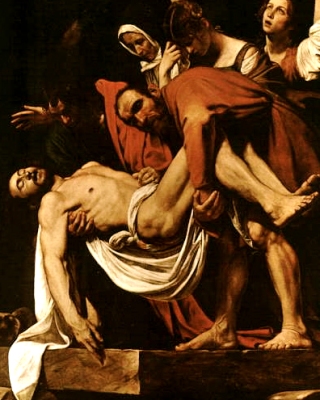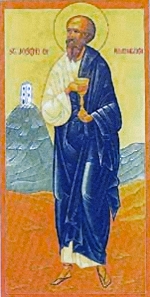
St. Joseph of Arimathea
Born: 1st C. in Arimathea, Palestine
Died: 1st C.
Canonized: pre-Congregation
Feast Day: March 17
Patron Saint of: funeral directors, undertakers
Joseph of Arimathea was a wealthy owner of tin mines in Cornwall. As a disciple of Jesus, he asked Pontius Pilate for permission to take Jesus' dead body in order to prepare it for burial (Mt 27:57-60). He also provided the tomb where the crucified Lord was laid until his Resurrection. Joseph is mentioned in a few times in parallel passages in Mark, Luke and John, but nothing further is heard about his later activities.
Legend which surfaced some 400 years later, however, supplies us with the rest of his story by claiming that Joseph, accompanying the Apostle Philip on a preaching mission to Gaul, was sent to Britain for the purpose of converting the island to Christianity. The year 63 AD is commonly given for this "event", with 37 AD sometimes being put forth as an alternative. It was said that Joseph achieved his wealth in the metals trade, and in the course of conducting his business, he probably became acquainted with Britain, at least the southwestern parts of it. Cornwall was a chief mining district and well-known in the Roman empire for its tin and other metals. Some have even said that Joseph was the uncle of Jesus, and that he may have brought the young boy along on one of his business trips to the island.
It was only natural, then, that Joseph should have been chosen for the first mission to Britain, and appropriate that he should come first to Glastonbury, that gravitational center for legendary activity in the West Country. It is said that he founded a church at Glastonbury in Somerset.
Much more was added to Joseph's legend during the middle ages, and he was gradually inflated into a major saint and cult hero. For example, he is said to have brought with him a cup said to have been used at the Last Supper and also used to catch the blood dripping from Christ as he hung on the Cross. A variation of this story is that Joseph brought with him two cruets, one containing the blood and the other, the sweat of Christ. Either of these items are known as The Holy Grail, and were the object(s) of the quests of the Knights of King Arthur's Round Table. The legend goes on to suggest that Joseph hid the "Grail" in Chalice Well at Glastonbury for safe-keeping.
There is a wide variance of scholarly opinion on this subject, however, and a good deal of doubt exists as to whether Joseph ever went to Britain at all, for any purpose.







